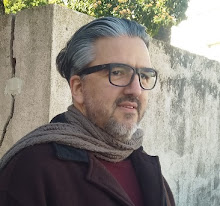"I lead a very isolated existence and I spend 90 per cent of my days alone," he says. "It took me a while to acclimatise to that way of life and it's quite difficult to reacclimatise to interaction with other people, let alone performing to an audience. Sometimes it's in a solitude that feels profound and comforting and desirable, and other times it's isolating and completely lonely. But I've always thought that to produce something fresh or new or of value you have to withdraw yourself from the common influences of society, and so I felt that withdrawing myself in this way might enable me to do away with any kind of conscious or subconscious influences that society might have on me by living in cities, soaking in media. The further I get away from that, the more I feel that this is my true voice. There's only so much permeating the work from the outside. Of course, I can't take into account what other people bring into the work. But in terms of my perception of it, it has a clarity to it or an integrity that it might not have if I lived under any other kind of circumstances. I'm not saying I can continue to live in this way or wish to live in this way, or it may just be the way I continue to live for the rest of my days or wathever, but this work [Manafon, editado dia 14 de Set.] was born out of that environment, it was born out of isolation..."
2. Budismo/improvisação
There's a kind of Ginsberg idea which comes from Buddhist teachings: first thought, best thought... right thought. So it's that kind of idea: not to much revision in the process of writing, just follow it through and wherever it takes you, wherever it leads, however revealing it might be, or what is it revealing, you're probably not aware of at the time but you just kind of go through it, find the melody for it, within that framework. It's a very intuitive process, I can't say that it's an intellectual process."
"The more I work on a piece, the further it seems to get from the original improvisational nature, the mood, spirit and atmosphere of the original improvisation," he cautions. "I mean, I could have cut into it. I could have really gone to town on editing the work but I didn't, I left the original performances more or less intact, to keep that spirit, that continuity if you like, alive. I didn't want to cut into it too much. Individual performances within that duration, within that timeframe – sure, there were edits made. But generally the overall arc of the work is as is performed on the day."
3. Fé/humanidade
(...) the way he talks and writes about it, Sylvian is perhaps proudest of Manafon's title track, named for the village where Welsh poet RS Thomas lived, and whose preacherly struggles with his faith, family and fellow man he sees as somehow key to the album.
"People didn't warm to him," explains Sylvian. "He was an austere man, quite frightening in his old age I think. People were intimidated by him. But the way he writes about the working man, the life of the working man, the life of the working man and the austerity of the life of the working man, is how it touches on an humanity that he can't himself connect with. He didn't seem to like people very much. He seemed to have trouble socialising and connecting with people, even with his own son. I just found the incongruity of these elements fascinating. So I guess it becomes a question of what do we do in life, where do we place our faith? In humanity.
[retirado da entrevista de David Sylvian a Biba Kopf na Wire de Set. 2009]

© Donald Milne

